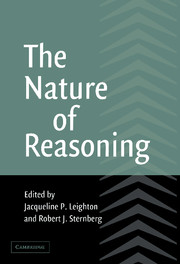Book contents
4 - The Role of Prior Belief in Reasoning
Published online by Cambridge University Press: 05 July 2011
Summary
In this chapter we examine research that uses well-defined laboratory problems requiring hypothetical thinking and reasoning for their solution. By “well-defined” we mean that all information required to solve the problem according to the instructions is explicitly presented. For this reason, psychologists have traditionally regarded any influence of prior knowledge or belief about the problem content or context to be normatively irrelevant to the definition of a correct answer. Consequently, where such beliefs exert an influence this has often been termed a “bias” by the investigators concerned. The effects of prior belief, however, turn out to be so pervasive in these studies that reasoning researchers in the past decade or so have begun radically to reexamine their assumptions about the nature of rational reasoning.
This reassessment has been no where more visible than in the study of deductive reasoning, one of the major paradigms in this field. Typical experiments involve presenting participants with the premises of logical arguments and asking them to evaluate a conclusion presented, or draw one of their own (for reviews, see Evans, Newstead, & Byrne, 1993; Manktelow, 1999). The deduction paradigm has its origins in logicism – the belief that logic provides the rational basis for human reasoning (Evans, 2000a). The modern study of deductive reasoning dates from the 1960s, where it was motivated by the writings of psychologists such as Henle (1962) and especially Jean Piaget (Inhelder & Piaget, 1958), who proposed that adult human reasoning was inherently logical.
- Type
- Chapter
- Information
- The Nature of Reasoning , pp. 78 - 102Publisher: Cambridge University PressPrint publication year: 2003
- 4
- Cited by



